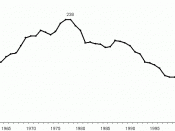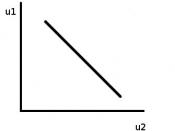The paper defines the term 'social welfare' and the distinction between selective/residual systems and universal systems.
What is Social Welfare?
The Concise Oxford Dictionary states the term 'welfare' stems from the root meaning of the word 'having a good trip or journey'. This conveys the idea of travelling smoothly on the road of life. Welfare is regarded in terms of people's well being. Welfare is often associated with needs, but it goes beyond what people need; to achieve well being, people must have choices, and the scope to choose personal goals and ambitions. Definitions tend to be exclusive (restricted to one area) or inclusive (encompassing every social welfare activity). Social welfare overlaps with the activities of many institutions and therefore giving a complete description is very difficult. However, the broader use of the term social welfare is popularly understood as cash or in-kind payments to persons who need support because of physical or mental illness, poverty, age, disability, or other defined circumstances.
Often the provider of such support is some form of governmental body, although in many cases, it is a voluntary organization, a church body, an occupational guild, or another nongovernmental group. (Compton, B.R. 1980)
Welfare Systems: Selective/Residual versus Universal
The objective of this section of the research paper is to demonstrate the distinction between the concepts of Universal systems and Selective systems. Should welfare be provided Universally or Selectively? Universalism provides services as a matter of right to all citizens. Selectivity involves establishing the criteria that gives access to welfare and a process for means testing applicants on a case basis. Selective benefits and services are reserved for people in need (Reddin, 2002).
The Diagram below illustrates the distinct differences between the two systems:
SELECTIVE UNIVERSAL
Nature Charity, assistance for poor and most needy Citizen right
Basis of provision Selective (e.g. means test, eligibility) Universal entitlement
Social stigma May carry stigma, No stigma
Ideology Free market, individual responsibility Collectivist, state responsibility
(Information accessible from the web pages of Basic Concepts of Social Welfare)
Universal welfare concepts are associated with an Institutional model, while Selectivity often refers to a Residual model of welfare. Institutional and Residual welfare are principles; Universality and Selectivity are methods.
A Universal system is one in which need is accepted as a normal part of social life. Welfare is provided for the population as a whole, in the same way as public services like roads or schools might be. In an Universal system, welfare is not just for the poor, it is for everyone. The main objection to Universal services is their cost.
(Jones, 1990).
Selectivity is often presented as being more efficient because it is means tested and less money is spent to better effect (Aspin, 1996; Graycar, 1979). There are problems with Selective services, however: because recipients have to be identified, the services can be administratively complex and expensive to run, and there are often boundary problems caused by trying to include some people while excluding others.
A parallel distinction is made between Institutional and Residual concepts of welfare. A Residual system provides that state social welfare institutions come into play only when all other avenues of assistance have been exhausted. An Institutional system, on the other hand, sees the state welfare service as a normal first line function of a modern industrialised and civilised society.


